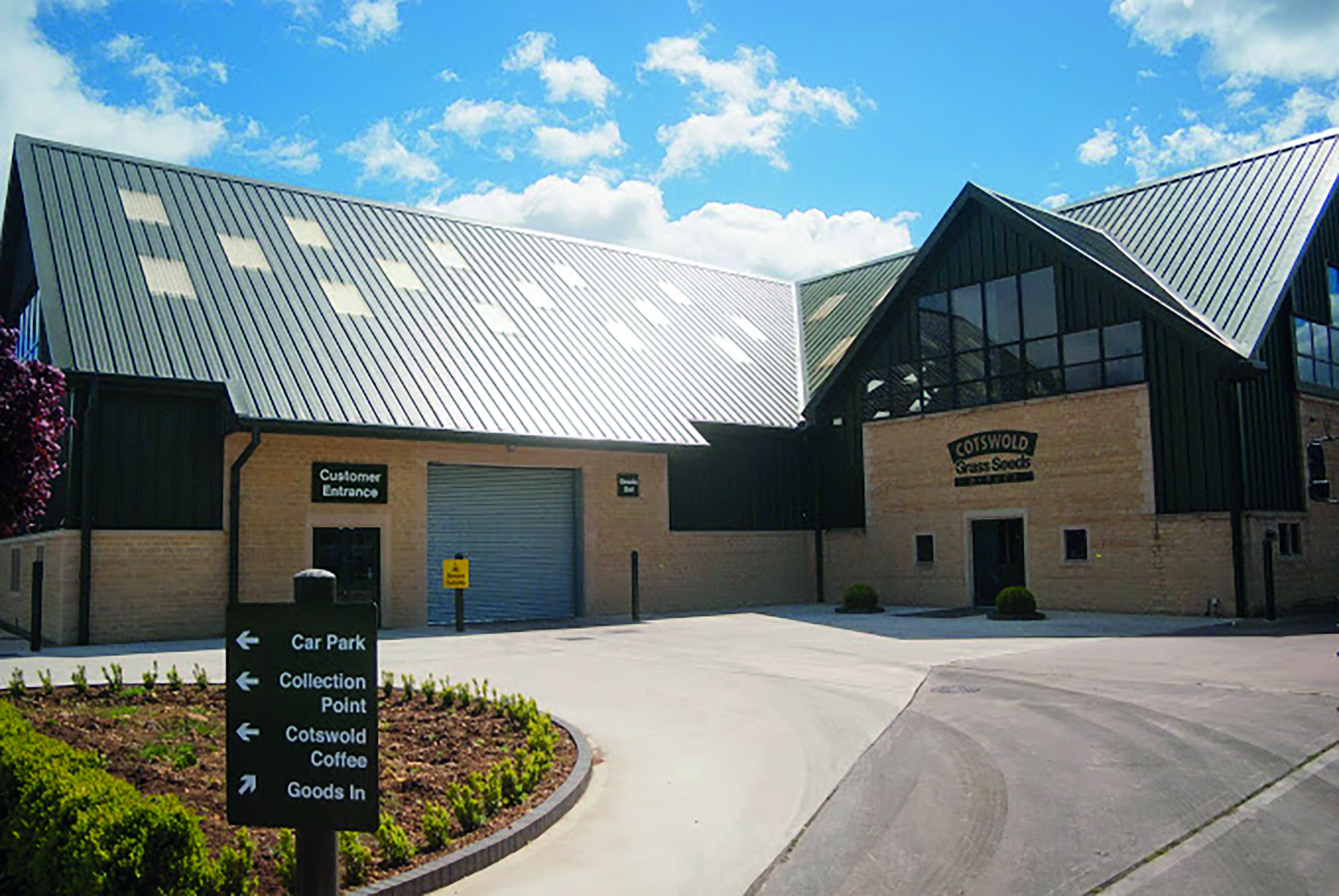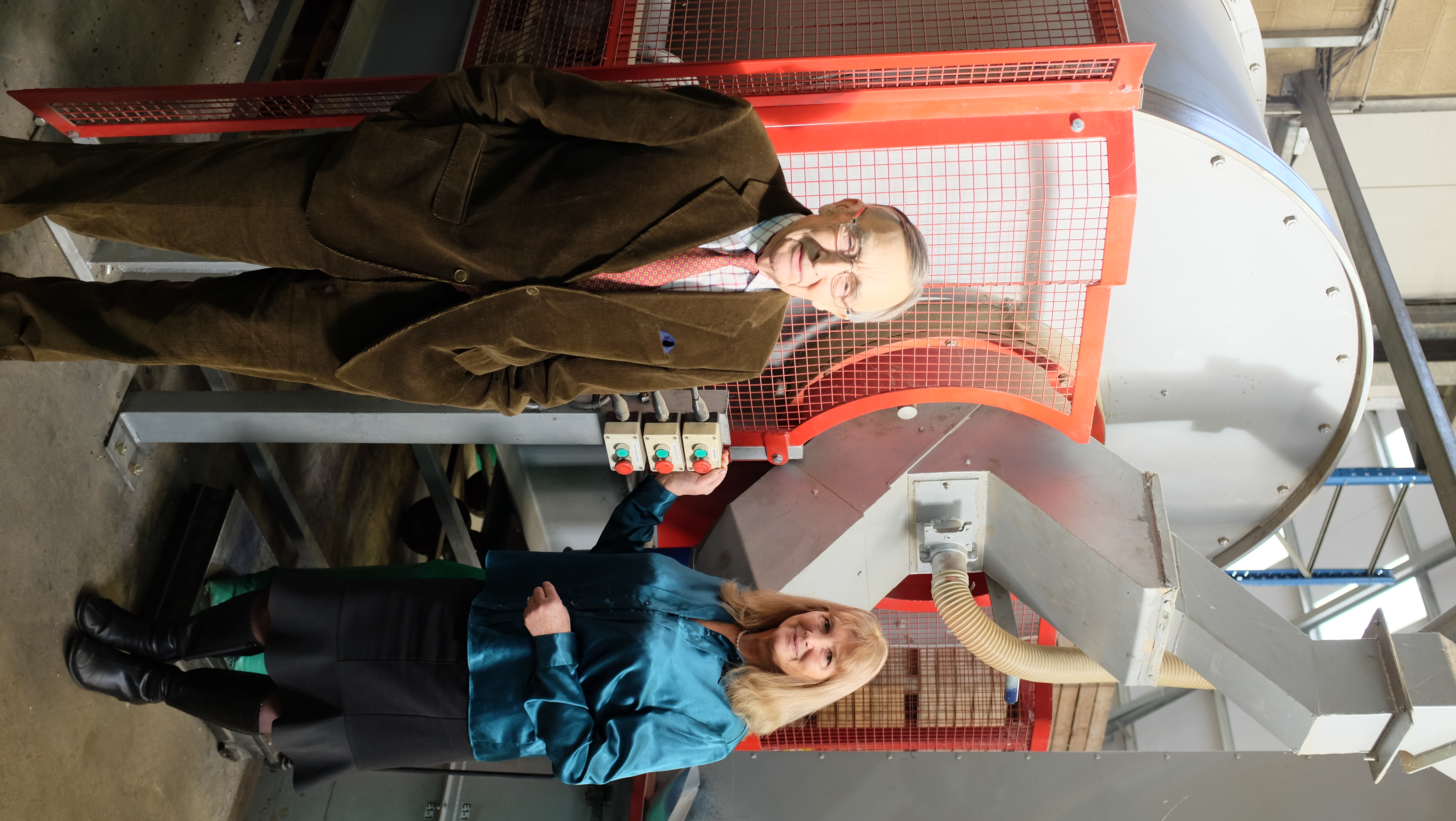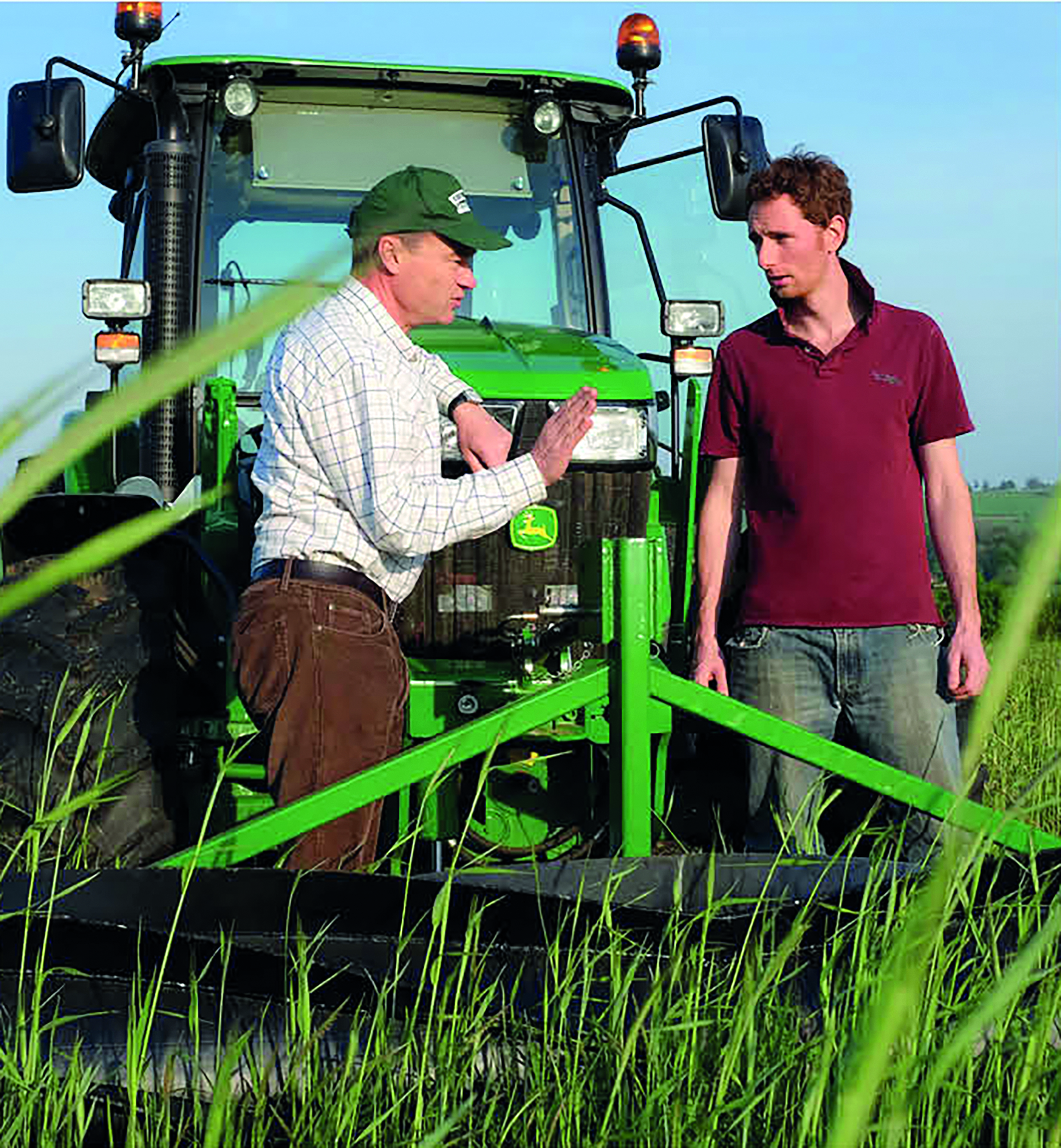





Robin Hill (b.1928) founded Cotswold Seeds in March, 1974. Unlike many of Cotswold Seeds’ customers, Robin didn’t come from a farming family. His father served in the Colonial Service, but Robin did spend the first 20 years of his life on a 15 acre smallholding in Northern Ireland and cited this as the roots of his love of agriculture. After finishing school, he made the decision to head to Cambridge, where he obtained a degree in agriculture. ‘Which wasn’t very helpful,’ remembered Robin. ‘It was based on pre-war agriculture, so we learned how the reaper and binder are pulled by a horse and were sent on a trip to study carthorses.’
But Robin’s passion for farming directed his career. Choosing to learn ‘from the bottom up,’ he became an under cowman on a dairy farm in Wiltshire, milking seven days a week, and progressing to jobs as farm manager. But when Robin was nearing the age of 30, he decided to go into business and joined a local merchant as a buyer of malting barley. He remained there for just two years before he decided to set out on his own. ‘We planned out the new business on the back of an envelope,’ Robin remembered, but he had a clear vision and was determined right from the start to do things very differently, which has been the ethos of Cotswold Seeds ever since.
What set Cotswold Seeds apart in the early days was Robin’s insistence on doing away with salesmen, having observed that some of his competitors employed a sales team of up to a hundred, resulting in high costs which could cripple a business. Robin’s first employee was the irascible Mr Francis, who had previously been a tea-planter in India. He had strict ethics which Robin respected, but he had his own way with customers, when they asked when they could expect to receive their order. ‘You’ll be lucky to get that in a fortnight,’ he would reply.
It couldn’t be further away from the Cotswold Seeds of today, distinguished by high levels of service and popular promise of next day dispatch. When Mr Francis left the business he was replaced by Elaine Hall. Though Elaine was employed as a book-keeper she did a bit of everything, from sales, to debt-collecting, keeping the customer file card index up to date - and shovelling the seed mixtures with an aluminium shovel. At this point the business was being run from a little office in Robin’s garden in Fifield in West Oxfordshire, and the warehouse was eleven miles away in the village of Aldsworth, later moving to tin sheds in Milton-Under-Wychwood, which was slightly closer. The orders for grass seed were collected during the week and processed over the weekend. The accountants kept questioning Robin’s determination to have a warehouse but he was as adamant as ever that Cotswold Seeds would do things differently and the warehouse was one of the company’s major USPs. ‘Other companies were just agents but we were selling direct to farmers,’ Robin said.
He was also buying direct too. Cotswold Seeds obtained its seeds from farmers with growing contracts and the severe drought of 1976 proved a testing time. Many farms dried up altogether and crops were devastated.
The complex seed mixtures in which Cotswold Seeds was increasingly specialising, were made even more complex by the fact that every one of the many ingredients had to be typed out for each invoice. The labels were all done by hand too, with a stamp which took a while to dry, so the orders had to be strung up like washing around the office.
The now iconic Cotswold Seeds catalogue was also starting to take shape, and Robin placed such an emphasis on its quality even in the early days, that he hired an electric typewriter, with built-in memory, for the annual task of catalogue compilation. After all the pages had been painstakingly typed by hand, and a solitary colour photo chosen for the cover, it was photocopied and collated, put into envelopes, addressed, stamped and posted - all by hand. The next difference was to improve the equipment. After five years the trusty aluminium shovel was replaced by a bespoke mixer. Robin had been asking around for a suitable one and eventually found that there was one going begging, in Yorkshire!
Robin and his wife drove up to fetch it and had it modified for grass seed. Filling the 50kg hessian sacks was still a dusty business, and hard work. And this was one of the tasks that fell to the current MD, Ian Wilkinson, when he came to Cotswold Seeds as a rookie, asking Robin for a summer job while he was a student studying farm and grassland management. Robin’s wife Susan was roped in to help with deliveries, loading seeds into the back of her Peugeot 504 estate, which conveniently held half a ton of seeds.
It was all well worth the effort, because nobody else was mixing their own seed and ‘we liked to know exactly what was going in,’ Robin said. The warehouse and hand-mixed seeds meant that Cotswold Seeds’ quality control has always been second to none.
In 1984 Ian finished his studies and joined Cotswold Seeds full time. He persuaded Robin to make the business more robust by dropping the less profitable cereals to concentrate on grass seeds. Then came the next revolutionary change. The company started using carriers and the delivery process became much more efficient thanks to computerisation, which enabled deliveries to be tracked and dispatched all over the country. This enabled the expansion of the business, building on the important base of local customers, to reach farmers further afield. With the introduction of a massively popular overnight delivery service the company was soon turning over £100k. The company started publishing prices and mixture contents as well as advertising straights in Farmers Weekly, which shook up the industry a bit as it had never been done before.
Cotswold Seeds was now using the mixer for marketing and advertising, symbolising the bespoke mixtures that have always set Cotswold Seeds apart.
The use of legumes had long been part of Robin’s vision and key to what Cotswold Seeds has always been about, but this interest grew after he was taken to meet Andre Pochon in Brittany, following a suggestion by an agricultural researcher. It helped to shape the future of the company. Monsieur Pochon had persuaded 2000 farmers to give up using nitrogen. ‘He believed in low input farming and he changed my attitude,’ said Robin. ‘He showed us 20 farms and the grass was waist high in May. Very impressive.
‘Would you put petrol in a car if it ran perfectly well on water,’ Robin said, by way of demonstrating the benefits of low input biological farming. He was very keen on slogans and believed ‘The Best in the Land’ was always the best way to describe Cotswold Seeds. Another might be, ‘No salesmen and no nitrates!’
The key to success, according to Robin, is ‘integrity, and a sense of humour’. Robin also acknowledged how chance can play its part in a company’s success. ‘Finding Ian was a key moment,’ remembered Robin. ‘Nothing short of a miracle. I rang up Berkshire Agricultural College to see if they had any students needing work, and they gave me Ian, their star pupil, who shared the same vision as me.’
‘I’m forever indebted to Robin Hill,’ says Ian. ‘He was my mentor, and taught me so much about farming, business and life. His belief in the use of legumes and a diverse, mixed farming defines what Cotswold Seeds stands for today. Robin’s byword was integrity, and he always stressed to me how important it is to be reliable and to believe in what you are doing. Until the end he still had great passion and vision, and was very supportive of the decision to purchase Honeydale Farm and set up the demo farm and the FarmED Centre. Even though he is no longer with us, it’s our intention here at Cotswold Seeds to stay true to his dreams and continue his legacy.’
The last quarter century has produced many challenges in the agricultural sector and the wider world, including the Foot & Mouth crisis in 2001 and the COVID pandemic more recently, but Cotswold Seeds has maintained the quality of it’s advice and service throughout, employing systems and people to enable the company to operate incredibly efficiently with an industry leading website and a purpose built order processing system, reaching more customers than ever. Not only that but the company underwent significant expansion, doubling capacity with a new and improved warehouse and a larger team - on the mixers, in the delivery vans and offering technical advice on the phone.
Close relationships have been forged with local organisations and businesses and the company is consistently involved with international scientific research projects, working with leading scientists and academics on projects such as Healthy Hay, LegumePlus, and lately Legume Legacy and CHCx3. Cotswold Seeds has remained at the forefront of industry developments, leading the way in what is now known as regenerative agriculture - the company was promoting the benefits of soil health and herbal leys long before they became mainstream, and is regularly consulted on legislation and policy.
None of this would have been possible without the team who have built on Robin and Ian’s hard work and vision. Paul Totterdell took on the daily running of the business in 2015, and alongside Lisa Lane, Sam Lane and Lizzie Arnold in the office and Mike Dearman, Mark Boydell, Rob Moulder and Mark Scarrot in the warehouse who have all been with us for many years. It’s thanks to their hard work and dedication that we’re able to offer the best mixtures and the best advice in the country, while maintaining true independence and impartiality.
Robin Hill passed away in 2017 but was very much behind the decision to purchase Honeydale Farm (now FarmED) to demonstrate regenerative farming and open a new chapter for Cotswold Seeds. Robin watched the growth of the company, from a team of two to 42 including the expansion into the new warehouse at Moreton-in-Marsh and developments at FarmED, with delight. ‘I have seen all my dreams come true,’ he said.
Date Posted: 11th March 2024



